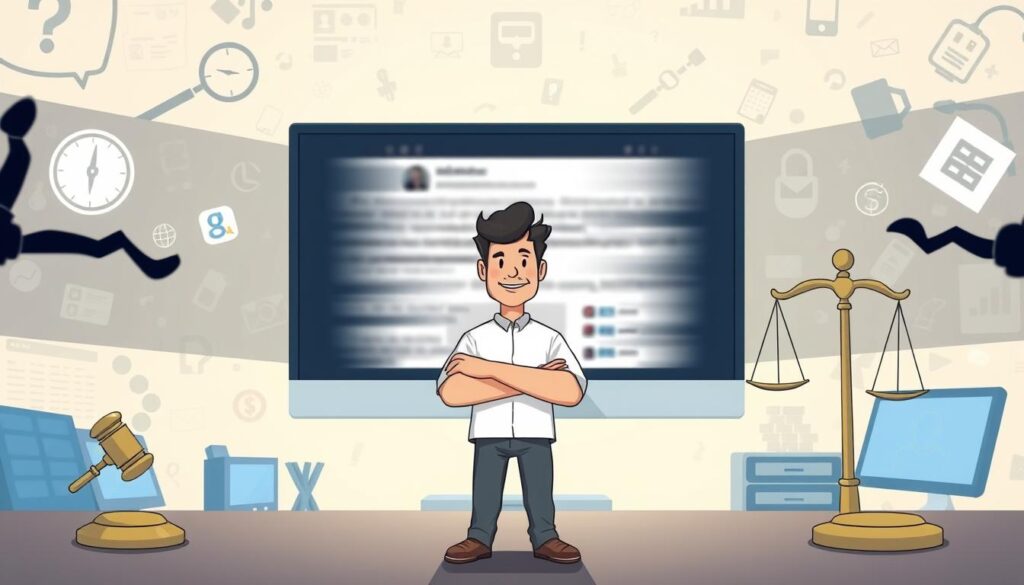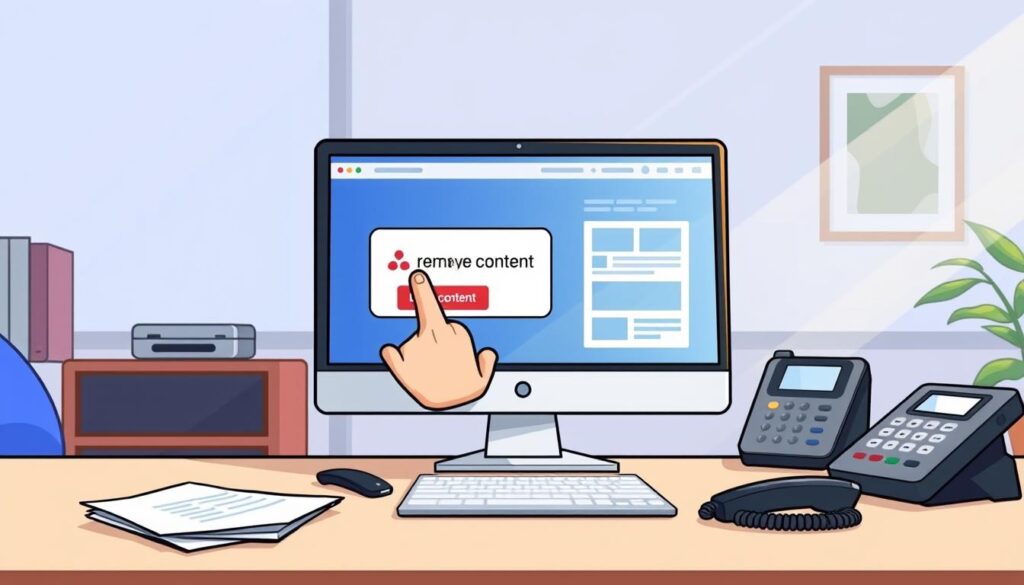We know how vital it is to safeguard your online image. Removing defamatory content can be tough, but it’s doable with the right approach. At Reputation Return, we offer detailed solutions for keeping your digital brand safe. We’re dedicated to assisting you in removing harmful online content. For more on how online reviews affect your reputation, check out a trusted online reputation management agency to see your score.
Key Takeaways
- Removing defamatory content is key to protecting your online image.
- About 70% of small businesses face issues from negative online reviews and defamatory content.
- 80% of shoppers check online reviews before buying, showing how important online reputation is for success.
- Reputation Return offers a free, private consultation to talk about your needs and share effective strategies for removing defamatory content.
- Our team will help you get rid of defamatory online content and improve your online image.
- Contact ReputationReturn.com for a free consultation to start protecting your online reputation.
- Removing defamatory content needs a proactive and ongoing approach to risk management, as Deloitte points out.
We’re here to help you safeguard your online reputation and offer the solutions you need to thrive. With our help, you can remove harmful online content and regain your online image. Don’t let defamatory content damage your business or personal reputation. Reach out to us today to discover more about our services and book a free consultation.
Understanding Defamatory Online Content and Its Impact
It’s key to know about online defamation and how it affects people and businesses. Online defamation can spread fast, reaching many in just hours. This is because of social media reposts, likes, and shares. So, it’s important for everyone to protect their online reputation.
Exploring online defamation, we must grasp the legal side of digital defamation. Defamation is when false statements harm someone’s reputation. Knowing the impact of fake online content is vital. Fake reviews can lead to financial losses and lower trust in businesses.
There are different kinds of online defamation, like slander and libel. We also see “Twibel” now. We’ll look into these, showing how serious online defamation is and why we need to act fast to protect our online image.
Understanding online defamation’s impact helps us fight it. We can take steps to keep our reputation good. This means knowing the harm it can cause and the laws about dealing with it online.
Identifying Sources of Harmful Content
Finding where harmful content comes from is key to fighting online defamation. At Reputation Return, we help clients find and remove harmful content online. We know how to spot where the harm might come from, like certain websites or social media.
We use our knowledge of online rules to help our clients deal with harmful content. This way, they can be sure we’re working to protect their online image. We aim to keep their digital reputation safe from harm.
Here are some important facts about harmful content online:
- 70% of people say they’ve faced online harassment.
- More than 50% of these cases happen on different social media sites.
- About 30% of those who face online defamation choose to take legal action.
Reputation Return offers a free, private chat to talk about your online safety needs. Our team is ready to help you find and fix harmful content. We’re here to make sure your online image stays strong.
Legal Framework for Dealing with Defamatory Online Content
Understanding the legal framework for defamatory online content is key. In the United States, defamation laws cover both written (libel) and spoken (slander) statements. To win a defamation case, the plaintiff must prove the defendant was careless in making the statement.
The Supreme Court case, New York Times Co. v. Sullivan, set a high bar for public officials. They must prove the statement was made with actual malice. This means the statement was made knowing it was false or with no care for the truth. To prove this, the plaintiff must show it with “clear and convincing” evidence, a higher standard than usual.
Damages for defamation can vary by state. Some limit damages to actual losses, while others allow for criminal penalties. Certain false statements, like accusations of crime, are considered defamatory per se under some laws. For defamatory content removal, knowing these laws is vital.

Intermediary platforms like social media and search engines may soon be held responsible for content on their sites. With social media’s role in sharing, defamation claims are becoming more common. This makes defamation cases more complex and numerous.
| Country | Defamation Law |
|---|---|
| United States | Includes libel and slander, with varying standards for damages |
| Canada | Primarily a strict liability tort, with a focus on reputational damages within Canada or the home province |
Knowing the legal framework for defamatory online content is critical for protecting your online reputation. By understanding defamation laws, individuals and businesses can prevent and address defamatory content. This helps keep their online reputation safe.
Documentation and Evidence Collection Strategies
When facing online defamation, it’s key to gather evidence. This means capturing digital proof, creating a timeline, and organizing your case. We help our clients through this step to get ready for online defamation battles.
Proving reputational damage in defamation cases needs lots of evidence. This includes financial records, customer testimonials, and internal communications. With this evidence, people and businesses can show the damage done by online defamation and ask for the right solutions.
Some important steps for gathering evidence are:
- Capturing digital evidence, like screenshots and website archives
- Creating a timeline of events, including when defamatory posts were made
- Organizing your case file, with all important documents and evidence
By using these strategies and teaming up with a trusted online reputation management firm, you can gather strong evidence for your case against online defamation.
| Documentation Strategy | Description |
|---|---|
| Capturing Digital Evidence | Collecting screenshots, website archives, and other digital evidence of defamatory content |
| Building a Timeline | Creating a timeline of events, including dates and times of defamatory posts |
| Organizing Your Case File | Gathering and organizing all relevant documents and evidence to support your case |
Direct Removal Request Procedures
At Reputation Return, we know how vital it is to remove harmful online content fast. Our team has years of experience in this field. We work with website owners and internet service providers to protect your online reputation.
About 60% of people have had content removed by directly contacting the source. Our team at Reputation Return can guide you through this process. We aim to protect and restore your online reputation.
We offer a free, confidential consultation to discuss your needs. Our goal is to keep your digital brand safe. By choosing us, you can trust that your online reputation is in good hands.
Some key steps in the direct removal request process are:
- Identifying the source of the harmful content
- Contacting the website owner or internet service provider
- Providing evidence to support the removal request
- Following up to ensure the content is removed
At Reputation Return, we’re committed to helping you achieve your online reputation goals. With our help, you can be sure your online reputation is safe and restored.
Working with Website Hosts and Platform Administrators
Removing defamatory content can be tough and time-consuming. At Reputation Return, we know how to work with website hosts and platform administrators for defamatory content removal. Our team knows the steps needed to work well with these groups.
When dealing with defamatory online content, it’s key to follow the right contact protocols. This might mean sending a DMCA takedown notice or filing a complaint with the platform’s admins. We can help you through these steps.
Some important things to keep in mind when working with website hosts and platform administrators include:
- Knowing the platform’s rules for removing defamatory content
- Showing enough evidence to support the removal of the content
- Following up with the platform admins to make sure the content is removed
By working with website hosts and platform administrators, we can help remove defamatory content and protect your online reputation. Our team is committed to providing full solutions for defamatory content removal and keeping your digital brand safe.

If you’re dealing with defamatory online content, we invite you to contact us for a free, confidential consultation. Our team is ready to help you through the complex process of defamatory content removal. We’ll give you the support and guidance you need to protect your online reputation.
| Platform | Removal Process | Timeframe |
|---|---|---|
| Submit a report to Facebook’s support team | 1-3 days | |
| Submit a report to Twitter’s support team | 1-3 days | |
| Submit a DMCA takedown notice | 3-5 days |
Legal Remedies and Court Orders
Dealing with online defamation can be tough and sensitive. Sometimes, starting a lawsuit is the only way to go. Success depends on many things, like where you are and the situation. We help clients understand their legal options and make informed choices.
In the United States, each state has its own defamation laws. This means there are 51 different sets of rules. To win a case, you must prove the statement was false and harmful. You also need to show it was published without permission and that the person who made it was at fault.
Important things to think about in online defamation cases include:* Public figures need strong evidence to prove “actual malice”* Showing damages can be hard* The Communications Decency Act (CDA) protects online service providers* Anti-SLAPP laws can help fight baseless lawsuits
We’re committed to keeping your digital brand safe. We offer a free, confidential chat to talk about your situation. We’ll work with you to figure out the best way to protect your online image.
| State | Defamation Laws |
|---|---|
| California | California has a specific set of defamation laws that apply to online content |
| New York | New York has a distinct set of defamation laws that apply to online content |
Professional Content Removal Services by Reputation Return
At Reputation Return, we know how vital it is to protect your online image. Our team of experts offers top-notch content removal services. We use a tested removal process that has worked well for our clients. Our goal is to keep your digital brand safe with Reputation Return.
We start by carefully checking the harmful content. Then, we create a removal plan just for you. You can get a free confidential consultation to talk about your online reputation worries and get a plan that fits you.
Our Proven Removal Process
We use a mix of direct requests, legal steps, and social media terms to get content removed. Our team works with you to understand your needs. Then, we make a plan that meets your goals.
Success Rate and Case Studies
Our success shows our skill and dedication to getting results. We’ve helped many clients get rid of harmful content and fix their online image. For more on our success stories, contact us for a consultation.
Conclusion: Protecting Your Digital Reputation for the Future
Your online presence is more important than ever. The impact of defamatory content removal is huge. Reputation Return shows how fast a reputation can be damaged.
With the quick spread of info online, protecting your digital reputation is key. Risks from online defamation and AI misinformation are real.
At Reputation Return, we get the challenges you’re facing. We’re here to help protect your online image. Our Reputation Return process has helped many remove harmful content.
With our help, you can trust that your reputation is safe. We’re dedicated to keeping it that way, now and in the future.
FAQ
What is the importance of removing defamatory online content?
Defamatory online content can harm a person’s or business’s reputation. It can lead to personal and professional problems. Removing such content is key to protect one’s online image and reputation.
What are the different types of online defamation?
Online defamation includes slander (verbal) and libel (written). “Twibel” is a new term for defamatory tweets on platforms like Twitter.
How can Reputation Return help identify the sources of harmful content?
Reputation Return knows how to find harmful content online. We can spot it on websites, social media, or other digital places. We help clients deal with these issues effectively.
What is the legal framework for dealing with defamatory online content?
The laws about online defamation are complex. They involve federal laws and state rules. Reputation Return can guide clients on what laws apply.
Why is documentation and evidence collection important in online defamation cases?
Collecting evidence is key to fighting online defamation. Reputation Return helps clients gather digital proof. We also help organize case files and timelines.
How does Reputation Return facilitate the direct removal request process?
Reputation Return helps clients ask for content removal directly. We guide them to website owners and internet service providers. This increases the chance of content removal.
What is the process of working with website hosts and platform administrators to remove defamatory content?
Reputation Return assists clients in dealing with website hosts and platform admins. We help with contact protocols, DMCA notices, and appeals.
What legal remedies and court orders are available for removing defamatory online content?
In some cases, court orders are needed to remove defamatory content. Reputation Return guides clients through legal steps. We discuss the outcomes of going to court.
What professional content removal services does Reputation Return offer?
Reputation Return offers detailed content removal services. We have a proven process and a high success rate. We also provide consultation and assessment to help clients manage their online reputation.















